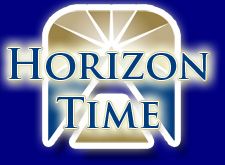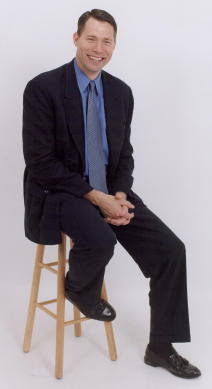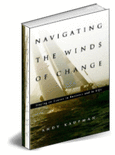
A leadership development resource
from the Institute for Leadership Excellence & Development Inc.
Volume II
Number 3
On the Horizon This Issue:
Ending Well
A key to handling the change you're going through right now is to end well. Here's how...
Relief from E-Mail Overload
Trouble keeping up with your e-mail
load? Here's help!
For Training Professionals Only
If you are responsible for supervisor
or management development training, check this out!


[Ending Well] [E-mail overload] [Training Pro's] [I LEAD Online]
![]()
Welcome to this edition of
Horizon Time! Quick note before you dive into the content below.... In addition to the Horizon Time e-newsletter you have subscribed to, there's another resource available to help you be a more effective leader.At your convenience, check out my weblog: Leadership in the Real World. Bookmark it today and check-in monthly for updates.
Thank you for the opportunity to pour into your personal and professional life. God bless you,
Andy Kaufman
Speaker, Author, Consultant
President, Institute for Leadership Excellence & Development Inc.
Ending Well
Adapted from Navigating the Winds of Change: Staying on Course in Business & in Life,
by Andy Kaufman
 If your company is reorganized and you end
up with a different boss, there is an ending (your previous relationship
with the old boss, your comfort level with his/her expectations, your
informal agreements) and a beginning (new expectations, the potential need
to re-establish credibility).
If your company is reorganized and you end
up with a different boss, there is an ending (your previous relationship
with the old boss, your comfort level with his/her expectations, your
informal agreements) and a beginning (new expectations, the potential need
to re-establish credibility).
If downsizing puts you on the streets, there is an ending (your job, any ego you had wrapped up in the position, security from a regular paycheck) and a beginning (new opportunities, the chance to re-assess what you want to do).
If someone close to you dies, there is an ending (the person’s life, his or her influence and companionship) and a beginning (the challenges of living without the person).
For just about any change that blows your way, you can identify endings and beginnings associated with it. What I want you to consider is this: ending is a key part of the change formula. Your success managing change as a leader depends heavily on how effectively you end well.
We typically think of mourning as appropriate for the major losses of our lives. There is value in considering the mourning process for lesser transitions as well.
Here's an example. For years I had dreamed of starting my own company to help organizations solve problems through leadership development and project management. I had experimented as a part-time speaker, writer, and coach, but ultimately I had to choose: Am I going to dream my dreams or try to live them? That fundamental question led to the decision to leave my Vice President position at ACNielsen and begin a new journey.
Certainly, career decisions are big but changes in employment are not generally situations most of us would consider grieving over, particularly if you think you are heading into a better situation. But as I prepared to leave, I actively applied this principle of ending well and mourning change.
Before announcing the change, I blocked out time to specifically reflect on how much I would miss particular employees and customers, how much I would miss working on products I had put so much energy into over the years, and recalling the lessons I had learned during my time with this fine company.
When I gave my notice, I worked out an arrangement that allowed much more than the standard two weeks to help transition the new person in smoothly. I made a point to call or e-mail each of the people who came to mind that had helped me over the years, and in each communication I tried to relate what I appreciated about them or learned from them.
The process took well over a month, but the net result was rewarding. I left with a sense of accomplishment—knowing that very worthwhile things were accomplished during my nearly nine years there, and that relationships were established that will last far longer than any product we developed. I ended well, and it felt great.
However, there are plenty of situations in which I did not close well, and I still deal with those regrets.
 One of my great high school memories was
having the privilege of playing on a very successful basketball team. My
senior year, the Morton Potters (yes, that was our name!) were 27-1 in a
season that resembled the movie Hoosiers.
One of my great high school memories was
having the privilege of playing on a very successful basketball team. My
senior year, the Morton Potters (yes, that was our name!) were 27-1 in a
season that resembled the movie Hoosiers.
The experience earned me a scholarship to play basketball at Northern Michigan University, an NCAA Division II school in the Upper Peninsula of Michigan. Tom Izzo, now the head coach at Michigan State University, was the assistant coach at Northern back then. I will never forget one of Tom’s trademark impassioned speeches: “If you quit before the end of your four years, you will regret it for the rest of your life.”
After three years of working hard, yet justifiably getting marginal playing time, I and my knees were feeling the toll. Realizing the Chicago Bulls would not be calling me, I started down the path toward “early retirement” even as Coach Izzo’s words burned in the back of my mind.
Rather than walking in and talking to the coaches, though, I just stopped showing up at informal team gatherings after my junior year season. I mentioned to team members that I was not going to return, but I never sealed the closure with those who had invested so much in me. Late in the summer I received a letter from the head coach informing me that he understood I was not returning, so my scholarship was going to be given to someone else.
In the early months of my senior year, I began feeling the regret Coach Izzo had talked about. I was not only a quitter, but I quit in an irresponsible way. For years I deeply regretted the decision, and even now I use it as a personal motivator to always end well. In fact, a growing passion in my speaking, writing, and coaching is to help leaders structure their responsibilities and goals so they can someday end well.
 Obviously, there are many changes in life
which make my experiences seem trivial. Just under a year ago our close
friends and neighbors left a tear-filled message on our answering machine,
"Please come over." That evening I sat and prayed with them as they
broke the news about a life-threatening diagnosis the husband had received.
Suddenly everything was different. This change rocked our close-knit
neighborhood as job number one became supporting the family through this
change. The terribly sad news is the husband died only seven months
later. Yet this tragic story illustrates both sides of ending well.
Obviously, there are many changes in life
which make my experiences seem trivial. Just under a year ago our close
friends and neighbors left a tear-filled message on our answering machine,
"Please come over." That evening I sat and prayed with them as they
broke the news about a life-threatening diagnosis the husband had received.
Suddenly everything was different. This change rocked our close-knit
neighborhood as job number one became supporting the family through this
change. The terribly sad news is the husband died only seven months
later. Yet this tragic story illustrates both sides of ending well.
A previous boss, someone who not only had managed the dying husband but knew the entire family, seemed unable to acknowledge the illness. He avoided contact with the family, a situation that pained both our friends deeply. Perhaps you understand the helplessness of "What do I say?" Yet he froze. And didn't end well. And regrets it to this day.
Yet their story is full of positive examples of ending well. The husband, fighting through each step of the journey with a positive attitude, left his children with an example of how to face the ultimate challenge. His wife literally never left his side, being the tireless, loving support that kept him going. The family and friends who surrounded them all, taking each step as it came, forming a team that helped us all make it through. In this tragic change, one that we would never chose for someone we love or want to walk ourselves, there are countless stories of ending well. (Click here for more on their story.)
 Whether
it’s a relatively easy change, or a more complex one like our neighbors,
the principle remains the same: Seek to end well in all the changes that
make up your life’s journey. Seek to resolve each chapter before getting
too far into the next.
Whether
it’s a relatively easy change, or a more complex one like our neighbors,
the principle remains the same: Seek to end well in all the changes that
make up your life’s journey. Seek to resolve each chapter before getting
too far into the next.
Ending well takes time. There is no rush. In sailing, it is actually a big advantage to change directions (or tack) as quickly as possible. If the tack is performed too slowly, the boat catches too much wind and momentum is lost. For us, however, there is often little benefit to rushing.
For the sake of perspective, let me suggest what I have seen work in the real world: Resolving the issues that accompany major life changes usually takes in the range of two years or more.
If you are in the wake of one of these major changes, are you trying to sail through it too quickly?
 If
you are close to someone on such a leg, could you be subtly trying to rush
them?
If
you are close to someone on such a leg, could you be subtly trying to rush
them?
There are no "5 Easy Steps to Ending Well." Different people go through the process at different speeds. Whether in your own situations or in those of people who you lead, don't rush the process. And don't disengage.
The more thoroughly you end well now, the more effective you’ll be later on in the voyage.

Navigating the Winds of Change: Staying on Course in Business & in Life.
Click on the book cover above to get your copy).
Andy Kaufman
Speaker, Author, Consultant
President, Institute for Leadership Excellence & Development Inc.
Personal Reflection Questions
1. What are some examples of when you ended well? Didn't end well?
How did ending well help you later?
2. Is there someone you love or lead that is going through a major change? How can
you help them end well? Is there a way that you need to end well with
them?
3. In what ways can you apply this teaching in your role as a leader at
work?
Relief for E-Mail Overload
 Spending
too much time
keeping up with e-mail? You're not alone.
Spending
too much time
keeping up with e-mail? You're not alone.
Join the rapidly growing number of people around the world who are getting a better grip on their e-mail while reducing stress.
Click on the e-book cover on the left to learn about How to Organize Your Inbox & Get Rid of E-Mail Clutter.
Practical. Easy-to-read e-book. Guaranteed to help.
Click here for more information.
For Training Professionals Only
 Are
you an experienced training professional who uses or implements leadership
and team development programs in your organization?
Are
you an experienced training professional who uses or implements leadership
and team development programs in your organization?
If so, I have a favor to ask you.
I have teamed up with Red Rover Solutions to conduct a brief research survey for NetSpeed Leadership™, a leading provider of leadership and team development training programs. As a certified NetSpeed consultant, I'd love to include you in helping us plan our 2004 product offerings.
As a token of appreciation for filling out a brief, online survey, Red Rover Solutions will give you:
-
A classroom facilitator clock (for use in training sessions or meetings)
In addition, NetSpeed Leadership will offer you:
-
A NetSpeed Leadership half-day training session facilitated by a certified NetSpeed consultant without cost to you
NetSpeed Leadership, based in Seattle, Washington, offers 22 half-day training modules followed by web-based performance support and measurement tools. With consultant partners in 16 states, NetSpeed Leadership has both national reach and local presence. They have a cutting edge approach to supervisor and management development.
The survey takes less than one minute to complete. Just enter your research code (101-174) and your password (learning) when you go online to:
www.redroversolutions.com/research
Please understand that your participation in this survey incurs no obligation on your part. To receive your facilitator clock and learn how you can receive your NetSpeed Leadership training session, be one of the first 50 people to go online and submit your completed survey by November 30, 2003.
Thanks!
Stay in Touch!
Horizon Time is written by Andy Kaufman and is available via e-mail or on the Web for all who register. You are invited to forward this to anyone interested in growing their leadership skills!
If you have any difficulty with the hyperlinks in this newsletter, you can view it online at:
www.i-leadonline.com/newsletter/0310.htm.
You can access past issues of Horizon Time by visiting www.i-leadonline.com/NewsletterIndex.asp.
If this was forwarded to you by a colleague and you would like to automatically receive issue, click here. Want to stop receiving these? Click here.
For more information on Andy Kaufman and the Institute for Leadership Excellence & Development Inc., please visit our web site.
You can contact Andy by phone toll-free at (866) 88 I-LEAD (866-884-5323), or by e-mail at andy@i-leadonline.com.
Editors and Newsletter Writers! Would you like to use some of the
material from this newsletter in your newspaper, magazine, newsletter?
You may by including the following credit line:
"This article is used by permission from Andy Kaufman's newsletter 'Horizon Time' available at www.i-leadonline.com."
Please call or send an e-mail to let
us know you used the article.
This information cannot be used for resale in any manner.
Horizon Time contains hyperlinks to web sites operated by persons other than the Institute for Leadership Excellence & Development Inc. (I LEAD). Such hyperlinks are provided for your reference and convenience only, and I LEAD is not responsible for the content or operation of such web sites. A hyperlink from Horizon Time to another web site does not imply or mean that I LEAD endorses the content on that web site or the operator or operations of that site. You are solely responsible for determining the extent to which you may use any content at any other web sites to which you might link from Horizon Time.
Copyright © 2001-2004, Institute for Leadership Excellence & Development Inc. (I
LEAD)
![]()